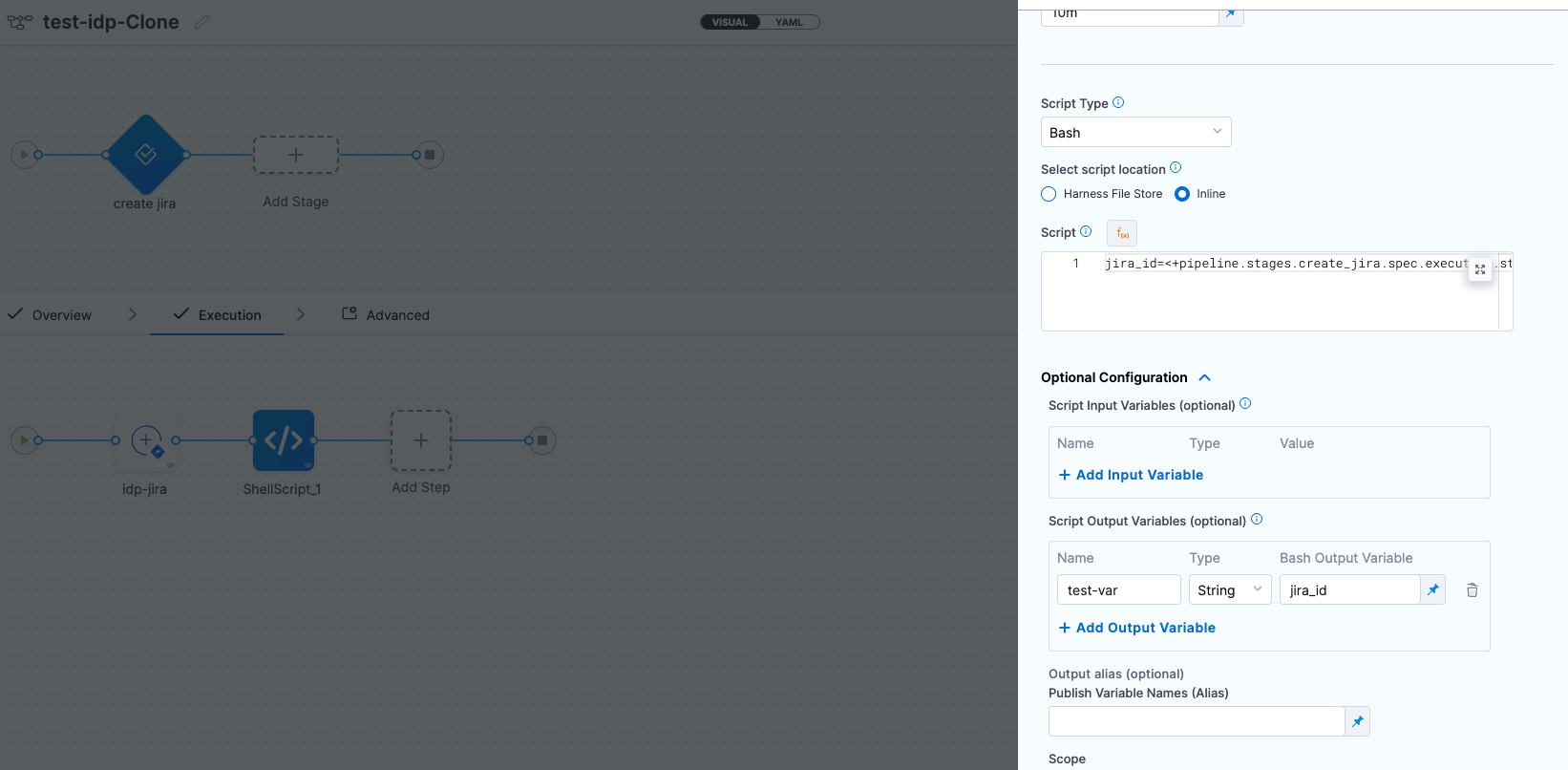Configuring Workflow Outputs
You can configure specific outputs for your workflows. Each step defined in your backend within workflow.yaml can generate output variables that are used in the frontend after task execution. These outputs can include direct links to newly created resources, such as Git repositories, documentation pages, or CI/CD pipelines, providing developers with immediate access to manage or monitor their onboarded resources.
Fetch Outputs from Harness Pipeline
To fetch and display output variables from a Harness pipeline in your workflow, you must configure the workflow YAML appropriately.
Step 1: Enable Output Display
In your workflow YAML, within the relevant steps block, set the following flag:
showOutputVariables: true
This flag allows the workflow to display the output variables generated by the pipeline.
Step 2: Define Output Variables
Once showOutputVariables is set, output variables from the pipeline can be referenced in two ways:
-
Directly referencing the output variable name:
${{ steps.trigger.output.test2 }}Here,
test2is the output variable created in the pipeline. -
Using the JEXL expression from execution logs:
- Copy the JEXL expression of the output variable and remove the JEXL constructs.
Example:${{ steps.trigger.output['pipeline.stages.testci.spec.execution.steps.Run_1.output.outputVariables.test1'] }} - In this case,
pipeline.stages.testci.spec.execution.steps.Run_1.output.outputVariables.test1is derived from:<+pipeline.stages.testci.spec.execution.steps.Run_1.output.outputVariables.test2>
- Copy the JEXL expression of the output variable and remove the JEXL constructs.
This approach ensures that pipeline outputs are correctly fetched and displayed.
Example workflow.yaml
steps:
- id: trigger
name: Creating your react app
action: trigger:harness-custom-pipeline
input:
url: "https://app.harness.io/ng/account/vpCkHKsDSxK9_KYfjCTMKA/home/orgs/default/projects/communityeng/pipelines/IDP_New_NextJS_app/pipeline-studio/?storeType=INLINE"
inputset:
project_name: ${{ parameters.project_name }}
github_repo: ${{ parameters.github_repo }}
cloud_provider: ${{ parameters.provider }}
db: ${{ parameters.db }}
cache: ${{ parameters.cache }}
apikey: ${{ parameters.token }}
showOutputVariables: true
output:
text:
- title: Output Variable
content: |
Output Variable **test2** is `${{ steps.trigger.output.test2 }}`
- title: Another Output Variable
content: |
Output Variable **test1** with fqnPath is `${{ steps.trigger.output['pipeline.stages.testci.spec.execution.steps.Run_1.output.outputVariables.test1'] }}`
Please note that while user-defined output variables are allowed for the above use-case, you can also use system-generated variables by assigning them as a new variable under the Shell Script step, as shown below.
For example, if a system-generated output variable is jira_id, you can define it as a user-defined output variable under Optional Configuration by assigning it to a new variable, such as test-var. This newly defined variable (test-var) can then be displayed as output in the IDP workflows.

Links to Generated Resources
The output can generate direct links to newly created resources, such as Git repositories, documentation pages, or CI/CD pipelines. This provides developers with immediate access to manage and monitor their newly onboarded resources efficiently.
output:
links:
- title: "Repository Link"
url: "${{ steps['repo-create'].output.repoUrl }}"
- title: "Pipeline Dashboard"
url: "${{ steps['deploy-pipeline'].output.pipelineUrl }}"
Service Metadata and Status
The output can include status messages or metadata from the onboarding process. For example, it can provide details about service registration or track the progress of resource provisioning, including success or failure messages.
output:
text:
- title: "Service Registration Status"
content: "Service registration completed with status: `${{ steps['register-service'].output.status }}`
Generate Files and Artifacts
Developers can configure workflows to generate essential files (e.g., README.md, YAML configuration files) or artifacts (e.g., Dockerfiles, Kubernetes manifests) as part of the onboarding process.
output:
links:
- title: "Generated README"
url: "${{ steps['create-readme'].output.fileUrl }}"
- title: "Kubernetes Manifest"
url: "${{ steps['generate-manifest'].output.fileUrl }}"
Dynamic Outputs Based on Inputs
Outputs can be dynamically generated based on user inputs. For example, if a user selects the "production" environment during onboarding, the output may include production-specific links, such as monitoring dashboards or production CI/CD pipelines.
output:
text:
- title: Output Variable
content: |
Output Variable **test2** is `${{ steps.trigger.output.test2 }}`
- title: Another Output Variable
content: |
Output Variable **test1** with fqnPath is `${{ steps.trigger.output['pipeline.stages.testci.spec.execution.steps.Run_1.output.outputVariables.test1'] }}`